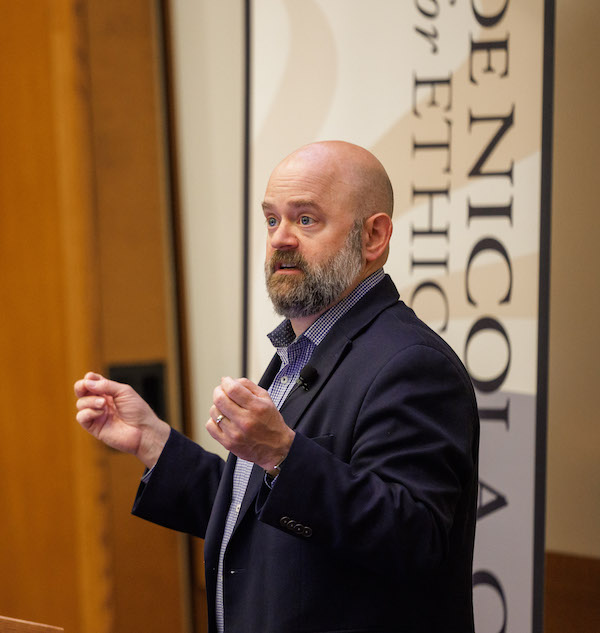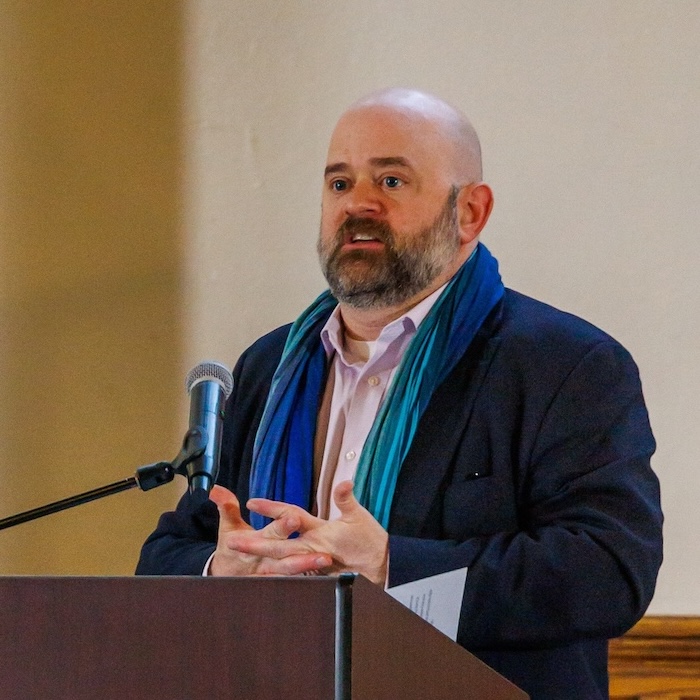
O. Carter Snead, Charles E. Rice Professor of Law and director of the de Nicola Center for Ethics and Culture at the University of Notre Dame, will conclude his directorship of the de Nicola Center at the end of June 2024, a position he will have held for twelve years.
“Serving as director of the de Nicola Center for the past twelve years has been one of the greatest privileges and blessings of my life,” Snead said. “While I am certainly sad to see that time come to a close, my heart is filled with gratitude for what our team has been able to accomplish.”
Snead was appointed director of the Center for Ethics and Culture in 2012, taking over from founding director David Solomon, professor emeritus of philosophy at Notre Dame. Renamed the de Nicola Center for Ethics and Culture following a $10 million endowment from the de Nicola family in 2019, the de Nicola Center has become the world’s foremost center for interdisciplinary research, teaching, and discourse within the Catholic tradition.
“Carter’s efforts on behalf of the de Nicola Center over the last twelve years have helped deepen the conversation on campus about questions of lasting import, and have raised Notre Dame’s profile as the place for serious discussion and research rooted in the Catholic tradition,” said Sarah Mustillo, the I. A. O’Shaughnessy Dean of the College of Arts and Letters. “I look forward to the contributions that both Carter and the de Nicola Center will continue to make to the College, the University, and in the public square in the years to come.”
Since the beginning of Snead’s directorship in 2012, the de Nicola Center launched or expanded a number of initiatives that sought to deepen conversation surrounding the most vexed questions of ethics, culture, and public policy today. Through the adoption of a strategic plan in 2017, the de Nicola Center focused its work on student formation, academic programming and research, mission stewardship, and culture of life initiatives.
In 2014, the de Nicola Center launched its Sorin Fellows program as its flagship student formation initiative. What began with 17 students has grown to an active cohort of more than 550 undergraduate, graduate, and professional students representing every college, dorm, and major on campus. In that time, more than 1,000 Sorin Fellows have received mentoring, dedicated academic programing, research support, pilgrimage opportunities, and fully funded summer internships all over the world. (Read more about Sorin Fellows activities.)
The de Nicola Center’s annual Fall Conference—the largest interdisciplinary academic event at Notre Dame—now routinely draws more than 1,000 participants and 150 speakers for three days of conversation as participants grapple with broad questions of enduring import in ethics, culture, and public policy today. Speakers at the conference include Nobel Laureates, Academy Award winners, Church leaders, world famous scientists, philosophers, theologians, artists, poets, and novelists, along with other eminent and emerging scholars from around the globe. Recently, the de Nicola Center has partnered with the Boundaries of Humanity project at Stanford University to broaden and continue these conversations with other top institutions around the world. (Read more about past conferences.)
The de Nicola Center revised and expanded four book series with University of Notre Dame Press, publishing 28 award-winning volumes since 2016, including the previously untranslated and unpublished works of Aleksandr Solzhenitsyn by special arrangement with the Solzhenitsyn family. Alongside its publications, the de Nicola Center has hosted an array of renowned senior visiting scholars who have conducted important writing and research during their residency with the Center, including John Keown (Georgetown), James Hankins (Harvard), and Zena Hitz (St. John’s College). The de Nicola Center’s three permanent senior distinguished research fellows—Alasdair MacIntyre, Mary Ann Glendon, and John Finnis—have routinely and consistently made outstanding contributions to the intellectual life of the de Nicola Center through their conference presentations, writing, research, and mentorship.
In addition to its scholarly research and student programming, the de Nicola Center has sought to support the University’s goal of attracting and retaining elite faculty in any field who are passionate about Notre Dame’s distinctive mission. Under its mission stewardship initiative, the de Nicola Center raised funds to create seven new professorships at the University—four entry level, one lateral, and two university chairs. In addition, the de Nicola Center funds two outstanding faculty members in the College of Science and has provided additional funding to support the salary and benefits for three faculty members in the College of Arts and Letters. (Meet our mission faculty.)
The de Nicola Center also created two endowed fellowships, the Polking and Solomon fellowships, for excellent law and graduate students who are passionate about the Center’s mission. Since the inception of these programs, more than two dozen students have received financial support, mentorship, and guidance through the de Nicola Center. (Learn more about these fellowships.)

For the past twelve years, the de Nicola Center has enthusiastically embraced its role as the key operational arm of Notre Dame’s institutional commitment to building a culture of life for every member of the human family, born and unborn. During this period, the Notre Dame Evangelium Vitae Medal has become the most important award for heroes of the pro-life movement; the Vita Institute has grown into the most sophisticated and effective interdisciplinary educational program for leaders working to build a culture of life around the world; and Notre Dame’s student contingent attending the annual March for Life in Washington, D.C., became the largest of any university in America.
During his tenure, Snead pursued and deepened his own research agenda focused on “public bioethics”—the governance of science, medicine, and biotechnology in the name of ethical goods. His book What It Means to Be Human: The Case for the Body in Public Bioethics (Harvard University Press, 2020) was named by the Wall Street Journal as one of the “Ten Best Books of 2020” and was described in a review therein as “among the most important works of moral philosophy so far in this century.” In 2021, Snead was the recipient of the Expanded Reason Award, and his book was cited in the New York Times as one of “Ten Books to Understand the Abortion Debate in the United States” in 2022. (Read more about What It Means to Be Human and Professor Snead’s public interventions.)
During his time as director, Snead was also elected as a fellow of the Hastings Center (one of two in Notre Dame’s history), a recognition for “uncommon insight and impact” and “outstanding accomplishment [by those] whose work has informed scholarship and/or public understanding of complex ethical issues in health, health care, life sciences research, and the environment.” He was also appointed to the Pontifical Academy for Life, which advises Pope Francis on bioethics issues. Most recently, he was appointed as the inaugural Charles E. Rice Professor of Law, a new university named chair. (Read more about the Charles E. Rice chair.)
Following the landmark 2022 Supreme Court decision in Dobbs v. Jackson Women’s Health Organization, the de Nicola Center emerged as the most important resource in academia and the global public square for illuminating the background, meaning, and import of the decision. Most recently, media commentators and public policy experts from across the ideological spectrum have widely praised the de Nicola Center’s nascent post–Roe “Women and Children’s First Initiative,” an interdisciplinary program of teaching, research, service, and public engagement aimed at building a world in which mothers, babies, and families are welcomed, protected, and supported throughout life’s journey. (Read more about the Women and Children First Initiative.)
The de Nicola Center currently rests on the strongest financial foundation in its history. Since 2012, due to new gifts from its large and diverse array of generous benefactors, the endowed funds associated with the Center have increased twelvefold, allowing the dCEC to grow and project its impact on a scale never before possible.
Under Snead’s leadership, the de Nicola Center has been a unique countercultural beacon in higher academia and the global public square for its unfailing commitment to exploring the full spectrum of the Catholic tradition, while engaging in civil discourse across disciplinary and normative divides.
“The academy today is too often balkanized into narrow ideological tribes, within which scholars only talk amongst themselves. Centers and institutes—even at Catholic universities—frequently occupy predictable ideological categories. Not so at the dCEC,” Snead said. “Because of the work of our team and supporters on campus and off, the de Nicola Center has been an exemplar of courageous intellectual engagement, rooted firmly in the Catholic tradition, pursuing the truth in friendship across multiple disciplines and lines of normative disagreement.”
